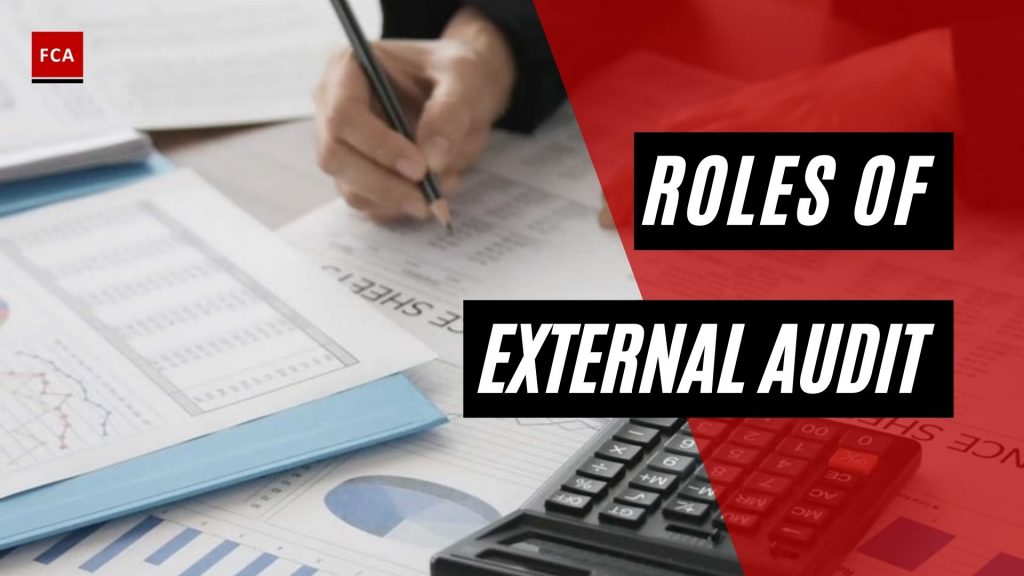Roles of external audit. External auditors are the independent third party or a body of professionals who perform the statutory audit of the organizations’ financial statements or the companies. The external audit is the necessary activity performed by external auditors to provide an independent opinion on the company’s financial performance and financial position.

Roles Of External Audit
External auditors are not related to or part of the management of the company, which is being audited by them, and therefore, they are required to maintain independence. Independence means the performance of audit activities and procedures without any influence by the board of directors r the management of the company or organization.
External auditors are qualified professionals in finance and audit; therefore, their audit activities and reports are considered very reliable by the shareholders and other stakeholders of the company.
Scope Of External Audit
The scope of external audit is limited to the organization’s financial statements or the company under audit. External audit, in most cases, is the statutory requirement, and the report of external auditors is shared with the shareholders of the organization or the company.
External auditors are required to apply the audit procedures on the financial information and transactions of the company that occurred during the past period. External auditors’ scope is limited to the financial information and transactions that occurred during the financial year.
External Audit Essentials
External auditors perform an audit of the organization’s financial statements, and their scope is limited to the financial statements amounts and balances. It is essential for external auditors to be independent of the organization or the company that is audited.
Independence means the external auditors must not be the company’s employees and should not take part in the decision-making process in any activity of the company. They perform an audit for the shareholders of the company vendors of the company, and they must not obtain significant services from the company of which they perform the external audit.
Should External Auditors Discover Fraud?
There may be the possibility that management of the organization prepares the financial statements fraudulently or try to artificially inflate or deflate the financial amounts to show the company’s wrong profits or financial position to the shareholders.
External auditors are required to obtain sufficient appropriate audit evidence to support the audit opinion on the financial statements of the organization or company.
Reasonable Assurance
External auditors are required to provide an opinion on the organization’s financial statements. They obtain evidence and corroborate the evidence to ensure that they may form a reasonable assurance that whether the company’s financial statements are prepared in all material respect by applicable financial reporting framework and financial statements are free from any fraud.
As the management or Board of Directors may be involved in preparing the financial statements fraudulently, therefore, to cover the risk of non-detection of management fraud in preparing the financial statements, the external auditors appropriately plan the external audit.
External auditors ensure that appropriate audit procedures are performed on the financial statements, balances, and amounts to identify any intentional fraud during the audit activities.
When the external auditors identify the frauds in the organization’s financial statements or the company, then the matter is discussed by the external auditors with those charged with governance or the board of directors. The auditors ensure that the board takes appropriate measures to rectify the identified frauds in the financial statements. After rectifying fraud impacts, the external auditors reperform the audit procedures on the financial statements to ensure that fraudulent financial statements are rectified appropriately.
When the Board of Directors does not take the initiative to resolve the fraud issues in the financial statements, then the external auditors report such fraud facts with the relevant regulatory authorities of the organization and the institutions.
Final Thoughts
External auditing is defined as the audit of a company’s financial records in which independent auditors carefully examine the validity of the company’s financial records to determine if there is any misstatement in the records due to fraud, error, or embezzlement and then report the same to the company’s stakeholders.
The external audit’s objectives include determining the completeness and accuracy of the client’s accounting records, ensuring that the client’s records are prepared in accordance with the accounting framework that applies to them, and ensuring that the client’s financial statements present true and fair results and financial position.









